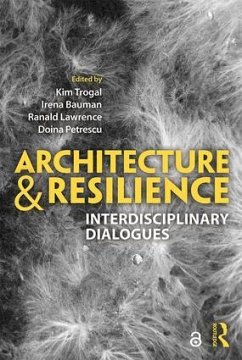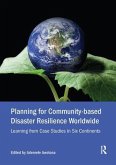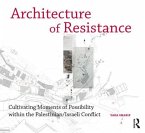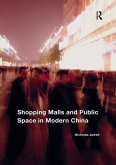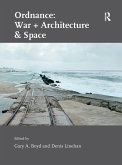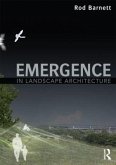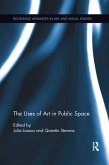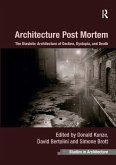Architecture and Resilience
Interdisciplinary Dialogues
Herausgeber: Bauman, Irena; Trogal, Kim; Lawrence, Ranald
Architecture and Resilience
Interdisciplinary Dialogues
Herausgeber: Bauman, Irena; Trogal, Kim; Lawrence, Ranald
- Broschiertes Buch
- Merkliste
- Auf die Merkliste
- Bewerten Bewerten
- Teilen
- Produkt teilen
- Produkterinnerung
- Produkterinnerung
Resilience will be a defining quality of the twenty-first century. As we witness the increasingly turbulent effects of climate change, the multiple challenges of resource depletion and wage stagnation, we know that our current ways of living are not resilient. This volume takes resilience as a transformative concept to ask where and what architecture might contribute. Bringing together cross-disciplinary perspectives from architecture, urban design, art, geography, building science and psychoanalysis, it aims to open up multiple perspectives of research, spatial strategies and projects that…mehr
![Planning for Community-based Disaster Resilience Worldwide Planning for Community-based Disaster Resilience Worldwide]() Planning for Community-based Disaster Resilience Worldwide76,99 €
Planning for Community-based Disaster Resilience Worldwide76,99 €![Architecture of Resistance Architecture of Resistance]() Yara SharifArchitecture of Resistance77,99 €
Yara SharifArchitecture of Resistance77,99 €![Shopping Malls and Public Space in Modern China Shopping Malls and Public Space in Modern China]() Nicholas JewellShopping Malls and Public Space in Modern China76,99 €
Nicholas JewellShopping Malls and Public Space in Modern China76,99 €![Ordnance Ordnance]() Denis LinehanOrdnance78,99 €
Denis LinehanOrdnance78,99 €![Emergence in Landscape Architecture Emergence in Landscape Architecture]() Rod BarnettEmergence in Landscape Architecture81,99 €
Rod BarnettEmergence in Landscape Architecture81,99 €![The Uses of Art in Public Space The Uses of Art in Public Space]() The Uses of Art in Public Space79,99 €
The Uses of Art in Public Space79,99 €![Architecture Post Mortem Architecture Post Mortem]() Architecture Post Mortem76,99 €
Architecture Post Mortem76,99 €-
-
-
Hinweis: Dieser Artikel kann nur an eine deutsche Lieferadresse ausgeliefert werden.
- Produktdetails
- Verlag: Routledge
- Seitenzahl: 302
- Erscheinungstermin: 18. Dezember 2018
- Englisch
- Abmessung: 234mm x 156mm x 16mm
- Gewicht: 462g
- ISBN-13: 9781138065819
- ISBN-10: 1138065811
- Artikelnr.: 54830729
- Herstellerkennzeichnung
- Books on Demand GmbH
- In de Tarpen 42
- 22848 Norderstedt
- info@bod.de
- 040 53433511
- Verlag: Routledge
- Seitenzahl: 302
- Erscheinungstermin: 18. Dezember 2018
- Englisch
- Abmessung: 234mm x 156mm x 16mm
- Gewicht: 462g
- ISBN-13: 9781138065819
- ISBN-10: 1138065811
- Artikelnr.: 54830729
- Herstellerkennzeichnung
- Books on Demand GmbH
- In de Tarpen 42
- 22848 Norderstedt
- info@bod.de
- 040 53433511
Irena Bauman, Ranald Lawrence and Doina Petrescu Dialogue: Narratives of
Resilience 2. Collective documenting of extreme urban transformations;
evidence of urban resilience during war in Sarajevo (1992-1996) Armina
Pilav 3. Future Works: stories resilience and resourcefulness Renata
Tyszczuk & Julia Udall 4. Building and Bearing Witness in Calais. An
interview with Grainne Hassett Grainne Hassett with Irena Bauman Dialogue:
Community resilience and the right to housing 5. Social architectures of
age-friendly community resilience: lessons from 'niche' intentional
community development Helen Jarvis 6. Building eco-homes for all:
inclusivity, justice and affordability Jenny Pickerill 7. Micro-resilience
and justice in São Paulo Beatrice De Carli Dialogue: New pedagogies of
resilience 8. Tackling climate change: comparing studio approaches in
Sheffield and Cape Town Ranald Lawrence and Kevin Fellingham 9.
Architecture of multiple authorship: beyond the academic year Sandra
Denicke-Polcher 10. Provocateurs or Consultants? The role of Sheffield
School of Architecture in the co-production of Castlegate An Interview with
Carolyn Butterworth Carolyn Butterworth with Ranald Lawrence Dialogue:
Challenging Climate Denial 11. Building resilience in the built environment
Susan Roaf 12. The new imagination in a culture of uncare Sally Weintrobe
13. Management before fabric An interview with Irena Bauman Irena Bauman
with Ranald Lawrence and Kim Trogal Dialogues: Resilience Ethics and
Interdependence 14. Resilient subjects: on feminist practice Elke Krasny
and Meike Schalk 15. Resilience as interdependence: learning from the care
ethics of subsistence practices Kim Trogal 16. The Organic Internet
Panayotis Antoniadis 17. Living resiliency: between planning and the
grassroots. An interview with Daniel D'Oca Daniel D'Oca with Kim Trogal and
Doina Petrescu Dialogues: Scales of resilience concerning the city, the
region and globalization 18. Globalization, Risk, and Resistance: The
production of new spaces of conflict and resilience Axel Becerra Santacruz
19. Learning from New Orleans: Social resilience for urban ecosystems
Marchella Del Signore & Cordula Roser Gray 20. From city policy to
neighbourhood. An interview with Tina Saaby Tina Saaby with Irena Bauman
21. Commons-Based Urban Resilience: an interview with Constatin Petcou and
Doina Petrescu - atelier d'architecture autogérée (aaa) aaa with Kim Trogal
Index
Irena Bauman, Ranald Lawrence and Doina Petrescu Dialogue: Narratives of
Resilience 2. Collective documenting of extreme urban transformations;
evidence of urban resilience during war in Sarajevo (1992-1996) Armina
Pilav 3. Future Works: stories resilience and resourcefulness Renata
Tyszczuk & Julia Udall 4. Building and Bearing Witness in Calais. An
interview with Grainne Hassett Grainne Hassett with Irena Bauman Dialogue:
Community resilience and the right to housing 5. Social architectures of
age-friendly community resilience: lessons from 'niche' intentional
community development Helen Jarvis 6. Building eco-homes for all:
inclusivity, justice and affordability Jenny Pickerill 7. Micro-resilience
and justice in São Paulo Beatrice De Carli Dialogue: New pedagogies of
resilience 8. Tackling climate change: comparing studio approaches in
Sheffield and Cape Town Ranald Lawrence and Kevin Fellingham 9.
Architecture of multiple authorship: beyond the academic year Sandra
Denicke-Polcher 10. Provocateurs or Consultants? The role of Sheffield
School of Architecture in the co-production of Castlegate An Interview with
Carolyn Butterworth Carolyn Butterworth with Ranald Lawrence Dialogue:
Challenging Climate Denial 11. Building resilience in the built environment
Susan Roaf 12. The new imagination in a culture of uncare Sally Weintrobe
13. Management before fabric An interview with Irena Bauman Irena Bauman
with Ranald Lawrence and Kim Trogal Dialogues: Resilience Ethics and
Interdependence 14. Resilient subjects: on feminist practice Elke Krasny
and Meike Schalk 15. Resilience as interdependence: learning from the care
ethics of subsistence practices Kim Trogal 16. The Organic Internet
Panayotis Antoniadis 17. Living resiliency: between planning and the
grassroots. An interview with Daniel D'Oca Daniel D'Oca with Kim Trogal and
Doina Petrescu Dialogues: Scales of resilience concerning the city, the
region and globalization 18. Globalization, Risk, and Resistance: The
production of new spaces of conflict and resilience Axel Becerra Santacruz
19. Learning from New Orleans: Social resilience for urban ecosystems
Marchella Del Signore & Cordula Roser Gray 20. From city policy to
neighbourhood. An interview with Tina Saaby Tina Saaby with Irena Bauman
21. Commons-Based Urban Resilience: an interview with Constatin Petcou and
Doina Petrescu - atelier d'architecture autogérée (aaa) aaa with Kim Trogal
Index

